In the second instalment with Toby Amies, the director of the perceptive and imaginative In The Court Of The Crimson King: King Crimson At 50 (dedicated to his mother Elisabeth and Bill Rieflin), music producer and 99 Records founder Ed Bahlman joined us on Zoom to share a memory of Robert Fripp from the April 28, 1973 King Crimson concert (with Redbone and The Flying Burrito Brothers), seeing the world premiere of his brilliant Frippertronics, the New York music scene (White Lines (Don’t Don’t Do It), Liquid Liquid, Grandmaster Flash and Melle Mel; ESG, Glenn Branca, Bush Tetras, Konk), and the challenges of remaining independent.
 |
| Ed Bahlman attended the world premiere in 1978 of Robert Fripp’s “brilliant” Frippertronics at The Kitchen in New York City Photo: Toby Amies |
We discuss the spirit of Bill Rieflin, whose manner resembles Peter Bognanovich, what to take from Silence Of The Lambs, Daisy Asquith (executive producer on The Man Whose Mind Exploded), his thanks to Genius Steals’ bandmate Jim Sclavunos and Jane Pollard and Iain Forsyth (directors of the Nick Cave documentary 20,000 Days On Earth), Toby’s TV experiences, 9/11, and the ability of music to restore grace for a brief moment.
Robert Fripp sets the tone of In The Court Of The Crimson King: King Crimson At 50 by personifying silence, as though it were an old friend, reluctant and capricious and always to be wooed: “The deepest experience I have is within silence, when silence walks in the room and sits down with us. For silence to become audible it requires a vehicle and that vehicle is music.”
From London, before the global premiere on October 22, Toby Amies joined Ed and me on Zoom for an in-depth conversation.
Anne-Katrin Titze: Memory enters your film not in the shape of archival footage.
Toby Amies: My experience in documentaries is when you start to dig too deep into the archive it can just slow the momentum of the film. I’m especially interested in documentaries allowing the audience to participate in a moment that I participated in. I want the whole film to feel as much as possible as if it’s happening in the moment. Even if they’re talking about the past, it’s in a way that is vivid, that is vital and is as much about the present as it is about something that happened several decades ago. And Robert’s pause is a very good example, as is the quite distressing interview done with Ian McDonald.
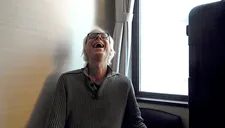 |
| Toby Amies on Bill Rieflin (Keyboards/Drums 2013-2019) who died during the editing: “I wanted to do right by Bill …” Photo: Toby Amies |
AKT: Personal memory is often very different from the archival footage and I agree with you in not wanting all this baggage there. I want to ask you about Bill Rieflin, whom you dedicated the film to, together with your mother. Is that correct?
TA: Yes. Both my mother and Bill died whilst I was editing the film.
AKT: My condolences.
TA: It’s haunted by their ghosts. I put a lot of myself into my films, it’s possible to say maybe too much. My first film, which is acutely about memory, The Man Whose Mind Exploded, I didn’t realise it was analogous to my relationship with my sister who was dying at the time the film was being made. I’m not so sure how my mother and Bill’s death affected this film, but obviously it directly addresses Bill’s dying.
AKT: The question is posed in the film: How much of the footage with him can you use?
TA: Yes, well, the ethics of documentary making are very important to me as well because I used to work in television, a medium in which ethics are deeply unfashionable and just considered an impediment to the making of money.
AKT: Well put!
TA: I wanted to do right by Bill and also Bill understood how the camera worked and the filming process better than any other member of the band. Other than the ever-present show of his mortality, we just had a dance. And it was an absolute joy. In the same way that also I have a sort of comic relationship with Jakko [Jakszyk], which is about making particular gags.
I had a different one with Bill, that was just as enriching. We never spoke about it too deeply with the exception of the conversation you see towards the end. He was acutely aware that his dying, and probably his death would prove to be a large part of the film. I always have to pre-empt what I’m about to say, that there’s really something dark and perverse and unpleasant about describing how you used your friend’s death in the construction of narrative in a piece of entertainment.
AKT: I get it.
TA: I just want to remind myself and everyone who reads an interview that I don’t do this callously.
AKT: It doesn’t come across that way at all.
TA: Thank you! Bill demonstrates to the audience that what they are watching matters. Because Bill’s presence in King Crimson says that if you are literally counting down the remaining days of your life, the thing that you choose to do is obviously important. By playing in King Crimson he demonstrates to us that it’s a worthwhile process.
 |
| Robert Fripp in In the Court of the Crimson King: King Crimson at 50: “For me the performance is sacred.” Photo: Toby Amies |
AKT: I think he says “Music can restore grace.”
TA: “If only for a moment.” My twin loves are music and cinema. Cinema is much more welcoming to people who are technologically inept than music is. So I ended up making films partly because I can’t play guitar or sing.
AKT: I do have someone here who would like to say hello and congratulate you on your film, Ed Bahlman of 99 Records.
Ed Bahlman: Hello Toby!
TA: Hold on, 99 Records who put out, I’m trying to think - I can’t remember their name but they did the break that became White Lines by Grandmaster Flash [credited as Grandmaster & Melle Mel]?
EB: Liquid Liquid.
TA: There we go, Liquid Liquid!
EB: I also did The Ascension album, Glenn Branca, who was together with Robert Fripp on many lists and radio shows. I want to thank you for the great job you did on this film. It triggered a few memories of Robert Fripp for me. I met him the first time - I had to look this up yesterday - on April 28, 1973.
 |
| Robert Fripp: “Look, I make no apologies. I don’t have the problem. The problems lies elsewhere.” Photo: Toby Amies |
TA: Was this before he went into Sherborne House? How crazy was he?
EB: Yes, I don’t know. I got in because there were two people who were getting the bum’s rush at the box office. It was the Academy of Music on 14th Street. Sold out King Crimson show with Redbone and The Flying Burrito Brothers, of all the acts.
TA: Wow! Who was headlining?
EB: King Crimson, totally sold out. My brother was in the audience with a couple of his friends. The Flying Burrito Brothers people couldn’t get in, they knew the drummer. So I said if I show you the backstage area, can I come in with you? They said sure and I spoke to the security and got the drummer to come out and I just walked right in to the show with them.
TA: Nice.
EB: I was standing stage left in the wings and Robert Fripp comes out. I didn’t know him personally. And he looks me over.
TA: Of course.
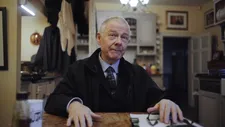 |
| Robert Fripp on Toby Amies’s request to film “in there”: “That is a question that actually distracts me from my performance.” Photo: Toby Amies |
EB: I saw him do something, that isn’t in your film. He got off his stool during the show, looked at me standing in the wings and he went behind who might have been Bill Bruford on drums with a talcum powder container and he was squeezing it up like a smoke machine. Then he looked back at me as if saying what a devil he is being doing this. The other time was seeing the world premiere of Robert’s brilliant Frippertronics.
TA: Oh yeah? Wow!
EB: At The Kitchen in ’78. If you could ask Robert, I have a vague memory that he also did a performance that was at a private residence, not in public.
TA: That was the premiere of Frippertronics?
EB: The world premiere at The Kitchen. That was the time when Brian Eno was recording the No New York album.
TA: There’s a guy actually who is making a documentary about Robert in New York about that period. I don’t know if he has been in touch with you.
EB: No.
TA: I’ll check in with him and see if he’s still doing it. If you’re interested, you seem to be very well positioned to be in that film.
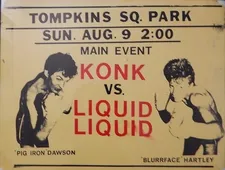 |
| KONK vs. LIQUID LIQUID showdown in Tompkins Square Park, New York City, courtesy Ed Bahlman Photo: Anne-Katrin Titze |
EB: Sounds good. I haven’t done interviews about that time. But we watched this year quite a few music documentaries [Ethan Silverman’s Angelheaded Hipster: The Songs of Marc Bolan & T Rex, dedicated to Hal Willner; Dayna Goldfine and Dan Geller’s Hallelujah: Leonard Cohen, A Journey, A Song; Celeste Bell and Paul Sng’s Poly Styrene: I Am A Cliché; Todd Haynes’s The Velvet Underground] and yours is by far the best.
TA: Thank you!
EB: The editing, the juxtapositions, the humanity of every player that you get. The personal remembrances right on camera, which no documentary caught this year.
TA: I was saying I put a lot of myself into my films. You know there’s that bit in Silence of the Lambs when Hannibal Lecter is talking about quid pro quo. The executive producer [Daisy Asquith] on my first film [The Man Whose Mind Exploded], I remember watching how she, even after she finished her film, she still had relationships with her subjects. They were not celebrities but sort of normal people.
And I remember being very impressed at her commitment. As I was saying, I used to work in telly, where we used to go in, we’d suck everything out of people’s life that was televisual, it was usually the most extreme elements of somebody’s personality. Then we would go away and create a caricature and that person would be left sort of poorer in lots of ways as a result.
So I determined that I was going to give as much of myself as I was expecting somebody to give. It’s an unpleasant process but I think it’s a more moral one and certainly it makes people feel more comfortable in speaking candidly to the camera. What I record is relationships. So when people asked; What’s it about? I said it’s about the human condition using King Crimson as the medium. Pretentious but true.
 |
| Liquid Liquid produced and mastered by Ed Bahlman on 99 Records Photo: Anne-Katrin Titze |
I think that’s why we go into cinemas, we want to see the issues that we struggle with. Hopefully not necessarily in a simplified form, but in a way that’s perhaps more digestible or at least in a way that allows you to look at it objectively. I used to be in a No Wave influenced band in New York in the late Nineties. My bandmate used to tell me about the reverse perspective approach to personal dilemmas: Imagine yourself watching a movie and the hero of the movie is in exactly the position that you are in.
EB: Wow!
TA: Then you work out what you would be doing: why don’t they do that thing? And I used that technique in my personal life, but it’s also kind of a way I look at films as well. Are you still putting out music?
EB: No, You reach a certain level of success independently and then you can’t go anywhere. Everybody wants to co-opt you.
TA: Yes!
EB: Island Records wanted to. Chris Blackwell wanted to give me an imprint on Island Records. I started meeting John Oates of Hall & Oates. I started seeing all of this going on around me. How can I stay independent and continue? Because I’m too well-known now. I also did Bush Tetras, Too Many Creeps.
TA: That’s right!
 |
| ESG 12” EP mastered by Ed Bahlman, Martin Hannett (studio tracks producer), Ed Bahlman (sound recording and producer live tracks) on 99 Records Photo: Anne-Katrin Titze |
EB: Pat Place out of the Contortions and all that. Anne-Katrin just did a feature with Jamie Nares, who as James Nares was the original guitar player of the Contortions.
TA: I see you did ESG as well! I think I’ve got like a six song 12 inch, not box set but vinyl thing [six song 99-04EP] and I’ve got the ESG one as well. Is it a double album? It’s the green and white one.
EB: No, Emerald Sapphire and Gold, the three colours.
TA: Oh, and I am looking literally at your Discogs’ page, you put out a record from Konk?
EB: Yeah, I helped distribute it.
TA: Because Jonny Sender who played in Konk, when I used to live in New York we used to DJ together an awful lot and then we briefly did some recording.
EB: Was that in the Nineties again?
TA: Yeah. I left New York in 2001. Between ’99 and 2000. We sold out Brownies, my band. Somebody wrote the name of the band on the bathroom wall, which made me so proud.
EB: What was the name of the band?
TA: It was Genius Steals, after that Oscar Wilde quote [talent borrows, genius steals]. Because I can’t play a note, I was using samples or steal basically.
AKT: I have to ask, did you leave in 2001 before September or after?
TA: I’ll send you a picture [and he goes to work on this right away].
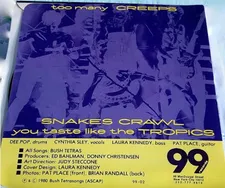 |
| Bush Tetras Too Many Creeps produced and mastered by Ed Bahlman on 99 Records Photo: Anne-Katrin Titze |
EB: That’s a cliffhanger.
TA: I lived on South 8th Street in Williamsburg. When I first moved to Wiliamsburg there was a burnt-out car on my street. By the Gretsch Building. Things have changed there now. It should be coming through to your email any second, Anne-Katrin.
AKT: Okay, got it.
TA: That was the view from my street.
AKT: I see it, wow. I saw it, too, I was living on 5th Street in Manhattan and saw them burning.
TA: Such an atrocity. I left New York soon after that, to be honest. Some of my very best friends still live in the city but I found the pressure to incessantly be hustling and making rent and also, as you were saying, the difficulty of remaining an independent operative when you have that pressure on you… I used to do a show for MTV and we used to say that we were broadcasting from the capitol of capitalism.
EB: Yeah.
TA: After a while I found it a bit too much for me. I have to say it’s a very exciting city and parts of it are very beautiful but on the whole, particularly the Brooklyn where I lived, looked like arse. I’m from the country and I like being around a bit more space and greenery and so on. It’s also where I was moving, shifting from being a TV host or whatever to being an artist. It’s a difficult place to find your way when there’s so many pressures coming from different directions.
EB: That would be a good public service announcement for Brooklyn: Brooklyn looks like arse. That would be a good ad. From the suburbs, win them back!
TA: Ha! Indeed!
 |
| In The Court Of The Crimson King: King Crimson At 50 poster |
EB: I was so pleased to watch the film and I told Anne-Katrin that Bill reminded me of Peter Bogdanovich, presenting himself.
TA: Oh really? Hey, do you know Jim Sclavunos?
EB: You thank him at the end credits. I’ve been trying to get in touch. I went through his so-called management.
TA: I can get you in touch, no problem.
EB: Also, you thank in your end credits Jane Pollard and Iain Forsyth who did the great documentary on Nick Cave.
TA: They are friends of mine. Jim I knew since I lived in New York because he played drums on one of our records, brilliantly. Iain and Jane I met because I liked their work and because I used to run a film night in London and they came and spoke and we just got on.
AKT: I talked with them about their Nick Cave film.
TA: Extraordinary piece of work that. They have a Marianne Faithful film in the works at the moment.
EB: Good luck with your premiere!
TA: Thank you. Please spread the word! I’m rather overwhelmed in a positive way about the reception to the film and I’m hoping we get another life for it after this weekend’s download thing and so on. It’ll be great if it gets into cinemas as well.
EB: It definitely has to come to NYC. I love your thoughts about chaos, how you’re a chaotic person.
TA: You have to recognize it, don’t you? And you’ve got to work with the material you’ve got and you can only bend it so far.
EB: Like producing a record with a band.
AKT: You can take showers. I’m the one taking the cold showers, Ed doesn’t [Robert Fripp in the film recommends taking cold showers].
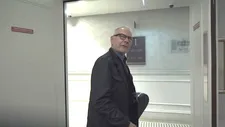 |
| Robert Fripp at the hotel after a performance Photo: Toby Amies |
TA: For yin there must be yang.
EB: Great talking with you, Toby!
TA: Thanks guys! Cheerio, bye-bye!
Read what Toby Amies had to say on his working relationship with Robert Fripp while filming In the Court of the Crimson King: King Crimson at 50, defining the boundaries of discipline and chaos, a scene with Christina Ricci in Vincent Gallo’s Buffalo 66, Sister Dana Benedicta’s message, Fripp’s touching remembrance of John Bennett (founder of The International Academy for Continuous Education Sherborne, Gloucestershire, England), and creating building blocks or handrails that allow people to know where they are.























